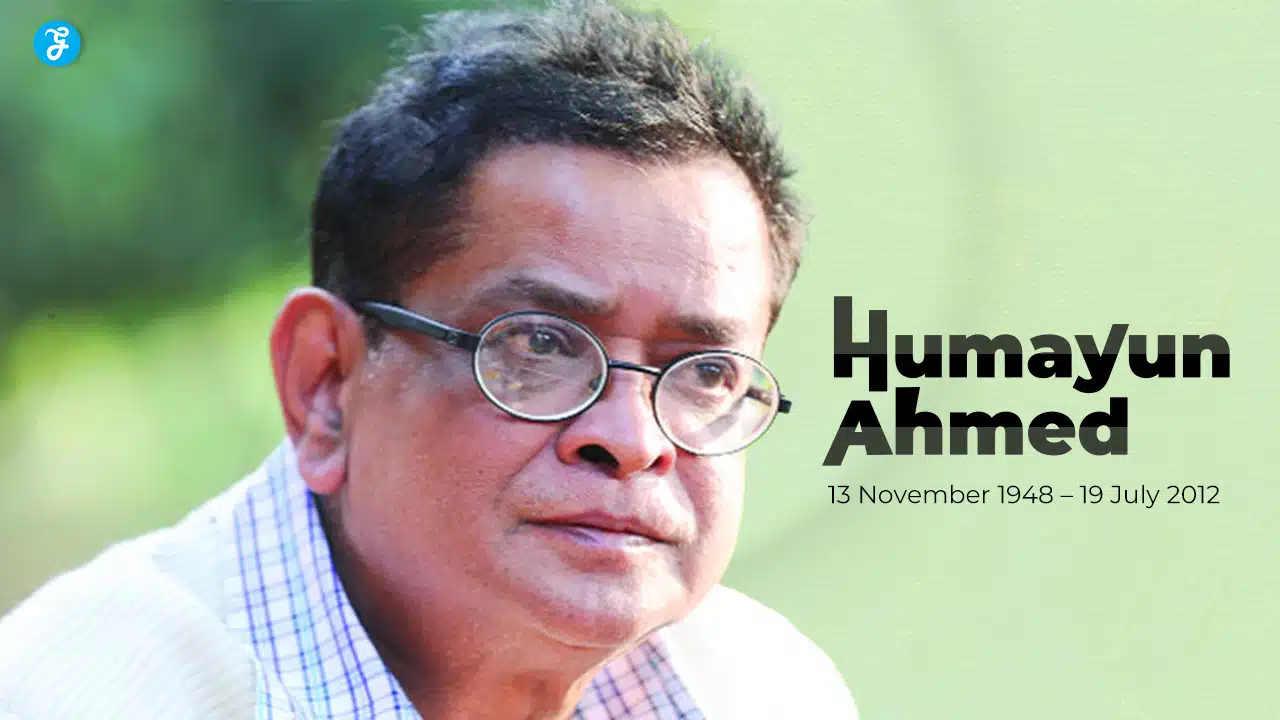Today marks the 76th birth anniversary of the legendary Bengali writer, playwright, and filmmaker Humayun Ahmed. Celebrations are taking place across Bangladesh as fans, family, and cultural organizations come together to honor his remarkable contributions to Bengali literature, television, and cinema.
A Literary Giant of Bangladesh
In Bengali literature, people revere Humayun Ahmed as one of the greatest writers, following in the footsteps of icons like Rabindranath Tagore and Kazi Nazrul Islam. Known for his distinct storytelling style that blends realism with elements of magical realism, Humayun Ahmed introduced readers to unforgettable characters, such as Himu, Misir Ali, and Baker Bhai. His writing career began with his debut novel, Nondito Noroke (1972), which instantly marked his place in the literary world.
Over his prolific career, he authored more than 200 fiction and non-fiction books, many of which became bestsellers in Bangladesh and continue to captivate readers of all ages. Humayun’s work dominated the Ekushey Book Fairs during the 1990s and 2000s, solidifying his status as a cultural phenomenon.
Acclaimed Awards and Recognitions
Humayun Ahmed’s literary and cultural impact earned him numerous prestigious awards, including the Ekushey Padak, Bangla Academy Award, Lekhak Shibir Award, Shishu Academy Award, Michael Madhusudan Padak, and Bachsas Award. These honors underscore his influence and contributions to Bengali literature, arts, and entertainment.
Pioneer of Bengali Television Dramas
In addition to his literary success, Humayun Ahmed was a trailblazer in television. His television career began with the drama Prothom Prohor (1983) on Bangladesh Television (BTV), and he went on to create several beloved drama series. These included Ei Shob Din Ratri, Bohubrihi, Ayomoy, Nokkhotrer Raat, and the iconic Kothao Keu Nei, which introduced the beloved character Baker Bhai, portrayed by actor Asaduzzaman Noor.
Contributions to Bengali Cinema
The 1990s saw Humayun Ahmed step into filmmaking, where he directed eight films based on his novels. He submitted his films Shyamol Chhaya (2004) and Ghetuputra Komola (2012) as Bangladesh’s entries for the Academy Award for Best Foreign Language Film. Throughout his career in cinema, he earned seven Bangladesh National Film Awards for films like Shonkhonil Karagar, Aguner Poroshmoni, Daruchini Dwip, and Ghetuputra Komola.
Family and Fans Celebrate His Legacy
The commemorations began at midnight with a gathering at his residence, Dakhin Hawa, where Humayun Ahmed’s widow, Meher Afroz Shaon, and their sons, Nishad and Ninith, joined admirers in a cake-cutting ceremony.
The fan group Himu Paribahan, named after one of Humayun’s most famous characters, traveled to Nuhash Polli in Gazipur to pay tribute to the author at his gravesite. Meanwhile, in Netrakona, Humayun’s hometown, the youth organization Himu Pathak Adda is hosting a day-long Himu Utsab, dedicated to celebrating his life and works.
Cultural Events and Tributes Across Bangladesh
In Dhaka, the theatre troupe Bahubachan will perform Ami Ebong Amra, a play based on Humayun Ahmed’s Misir Ali series, at the Bangladesh Shilpakala Academy at 7 pm. The Academy’s Poet Shamsur Rahman seminar room will host a seminar at 4 pm to honor his contributions. Salah Uddin Shuvro will be the keynote speaker, and Professors Ahmed Mawla and Sumon Rahman will lead discussions under the direction of Professor Mohammad Azam, Director General of the Bangla Academy, who will also give a welcome speech.
Throughout the day, fans, family, and admirers will pay tribute at Humayun Ahmed’s tomb in Nuhash Polli. Prayer sessions will be held, honoring his lasting legacy and the profound influence he continues to have on Bengali culture.
Remembering a Cultural Icon
As Bangladesh observes the 76th birth anniversary of Humayun Ahmed, it is a day of celebration and remembrance for a man whose stories, characters, and vision shaped the nation’s literature and entertainment landscape. His legacy endures, inspiring new generations of readers, writers, and artists, forever leaving his mark on Bengali culture.




































